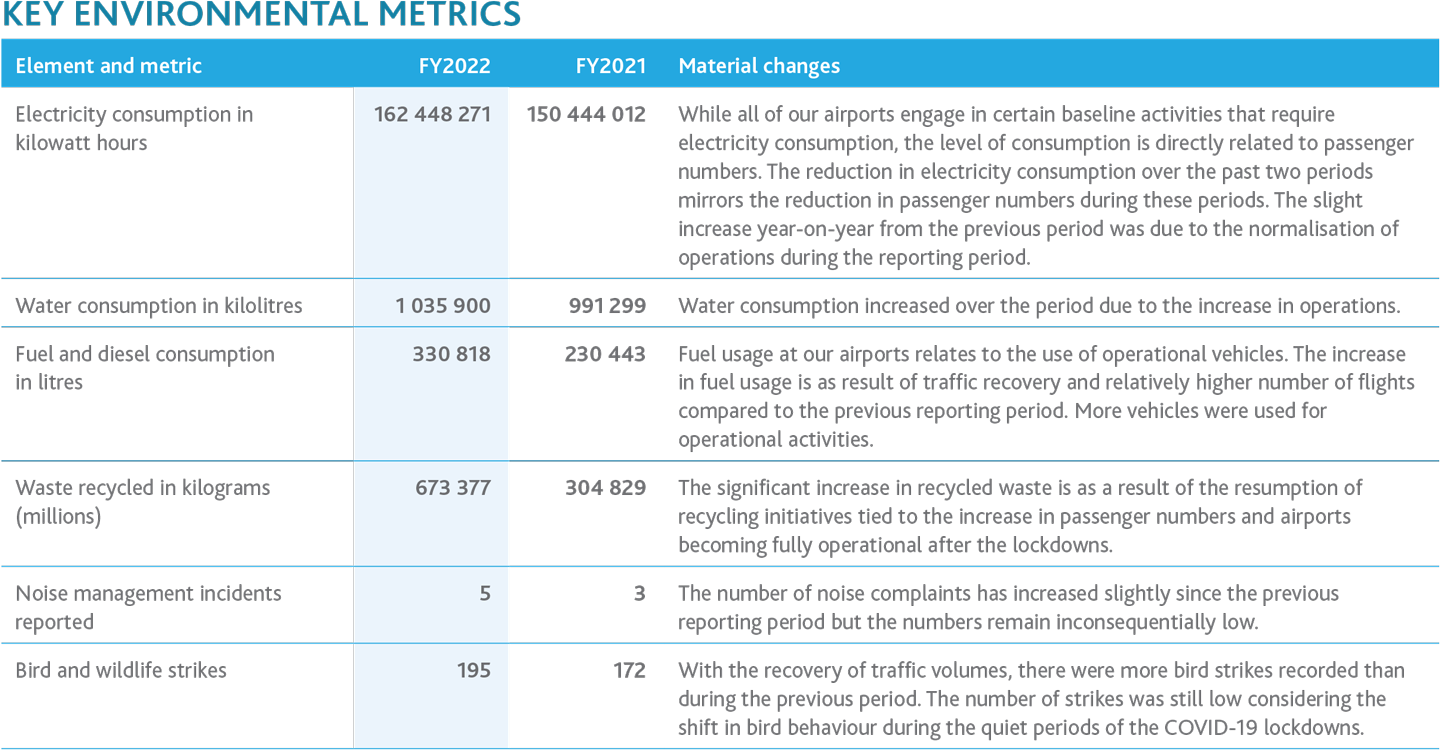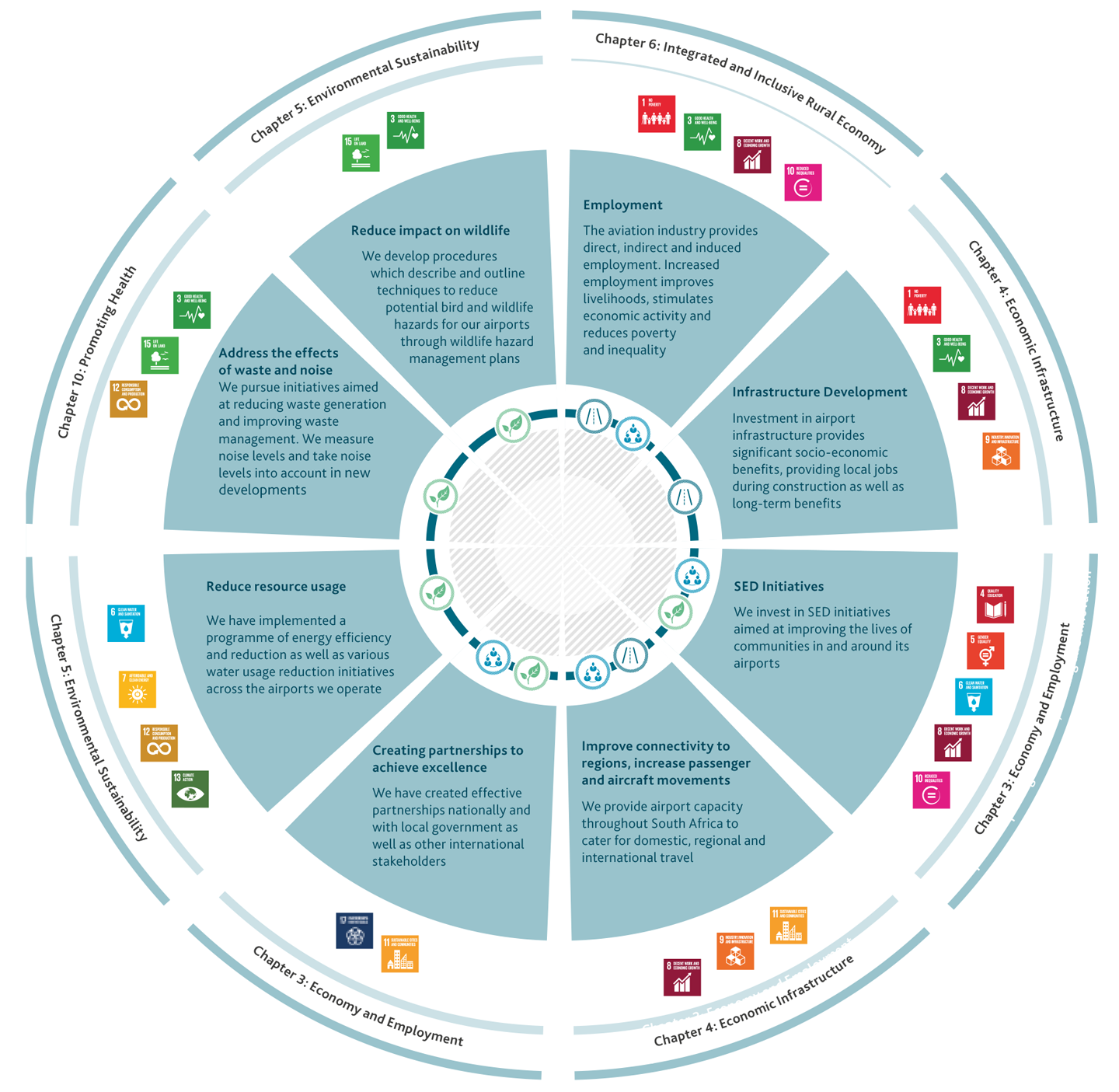TRANSFORMING OUR ENVIRONMENT
We proactively assess and manage the environmental impact of our operations in line with our integrated transformation and sustainability objectives. As in the previous period, our environmental impact was considerably lower during the reporting period than it was prior to the advent of the pandemic due to the effect that local and international travel restrictions had on our operations. Not only did these dramatically reduce air traffic, they also led to a reduction in ancillary activity, with far fewer vehicles operating within and around our airports. This, in turn, led to lower carbon emissions and fewer associated pollution events such as spillages and leaks.
Similarly, our use of water and electricity was much lower than it was prior to the pandemic, partly as a result of reduced passenger traffic and partly due to the implementation of remote working arrangements for our staff. Waste generated was also significantly lower, but so were efficiencies, given that certain airport infrastructure requires a baseline of activity regardless of passenger and staff numbers.
MONITORING INITIATIVES
In the previous period, we reported that certain monitoring initiatives had been curtailed due to operational activity being low. Some of these monitoring initiatives were started up again during the reporting period, but were not ramped up to pre-pandemic levels. Ongoing engagements are being held with the relevant regulators to ensure that ACSA remains compliant with its obligations regarding environmental monitoring.
NOISE
As in the previous period, the impact of noise resulting from our operations was significantly reduced during the reporting period. This was largely due to the lower number of flights during the pandemic. While the number of flights did, however, increase significantly during the
2022 financial year, the number of noise complaints remained very low. We anticipate that, as the sector recovers more fully, the number of noise complaints will increase.
KEY ENVIRONMENTAL STAFF
The ongoing impact of the voluntary separation and early retirement packages that were offered during the pandemic continue to be felt. However, there have been significant improvements in the competency of the incumbents who took on additional work related to the Environmental Management System.
AIRPORT CARBON ACCREDITATION
O.R. Tambo International in Johannesburg, King Shaka International in Durban, Chief David Stuurman International in Gqeberha (previously Port Elizabeth) and Cape Town International all maintained their Level 2 Airport Carbon Accreditation throughout the reporting period.
As recovery gains ground, we will investigate the feasibility of expanding this programme to the remaining airports in our portfolio.
ROADMAP TO CARBON NEUTRALITY
The constraints on capital expenditure resulting from the pandemic have resulted in us having to adjust the timing of the projects that make up our Roadmap to Carbon Neutrality. While the initial goal of achieving carbon neutrality for Scope 1 and Scope 2 emissions at all of our nine airports by 2030 has not changed, the timing of the projects required to reach this goal has been amended, with most energy-reduction projects having been moved into the 2027 to 2030 timeframe.
At present, our focus is on the production of renewable energy at our largest airports, which will not only contribute to the process of becoming carbon neutral, butwhich will reduce our dependency on the national grid. These initiatives, together with the use of natural gas to generate electricity, which is less carbon-intensive than coal-powered generation, are helping us to lower carbon emissions despite the current moratorium on new capex projects.
Further, as carbon reduction projects are related to air traffic volumes, these will be implemented in line with sector recovery.
ISO 14001:2015
The certification audits for all nine airports took place during the reporting period. All met the requirements of the ISO 14001:2015 Environmental Management System Standard and were duly certified. The audits will continue in 2022 and 2023 in line with the certification cycle.
LEGISLATION AND COMPLIANCE
In terms of compliance, we contracted environmental legal consultants to assist with the development and implementation of site-specific environmental legal registers, which take into account primary, secondary and tertiary legislation in all spheres of government. These registers provide each airport with the legal requirements pertinent for their location and context, as well as with formal means for tracking compliance.
ENVIRONMENTAL INCIDENTS
During the year under review, there was one environmental incident, which occurred at the King Shaka International Airport. This was a rupture of a sewer line due to a landslide that came about as the result of flooding. The incident was reported to the authorities and they have been included in the development of monitoring and remediation plans to rectify the matter.

OUR CONTRIBUTION TO THE UNITED NATIONS SUSTAINABLE DEVELOPMENT GOALS AND THE NATIONAL DEVELOPMENT PLAN
The United Nations Sustainable Development Goals (SDGs) provide a framework for improving the living standards of the world’s population, eliminating gender and income inequality, and protecting the environment. Globally, they are used as a benchmark to measure the contributions made by businesses, industry and other organisations to the process of sustainable development. We measure our development contributions within this framework as well as within the framework of South Africa’s National Development Plan (NDP).
The aim of the NDP is to significantly reduce poverty and inequality by 2030. The framework it provides consists of 15 chapters that focus on critical issues such as unemployment, education, infrastructure development, inclusive economic development, access to quality healthcare, environmental sustainability and corruption.
In line with the SDGs and the NDP, we aim to create sustainable value for all stakeholders and minimise the negative impacts we have on the communities in which we operate and on the natural environment.







